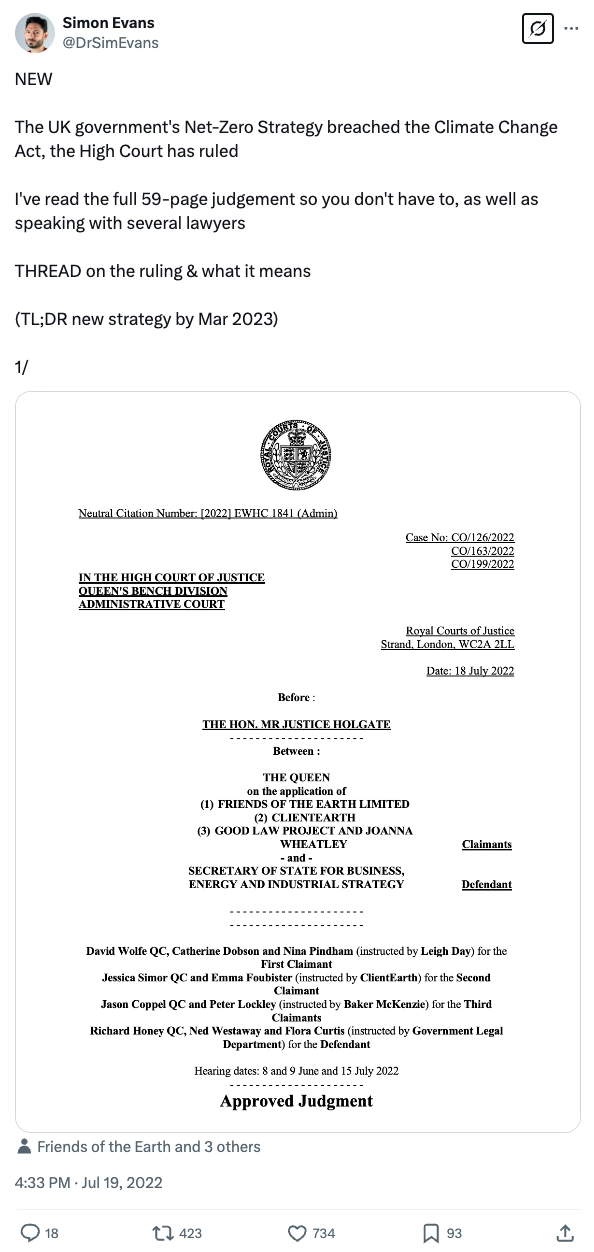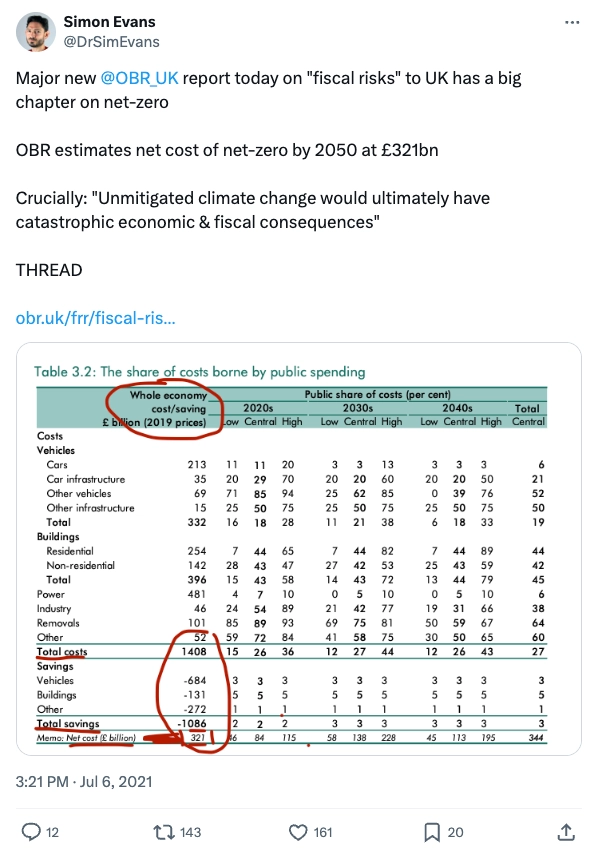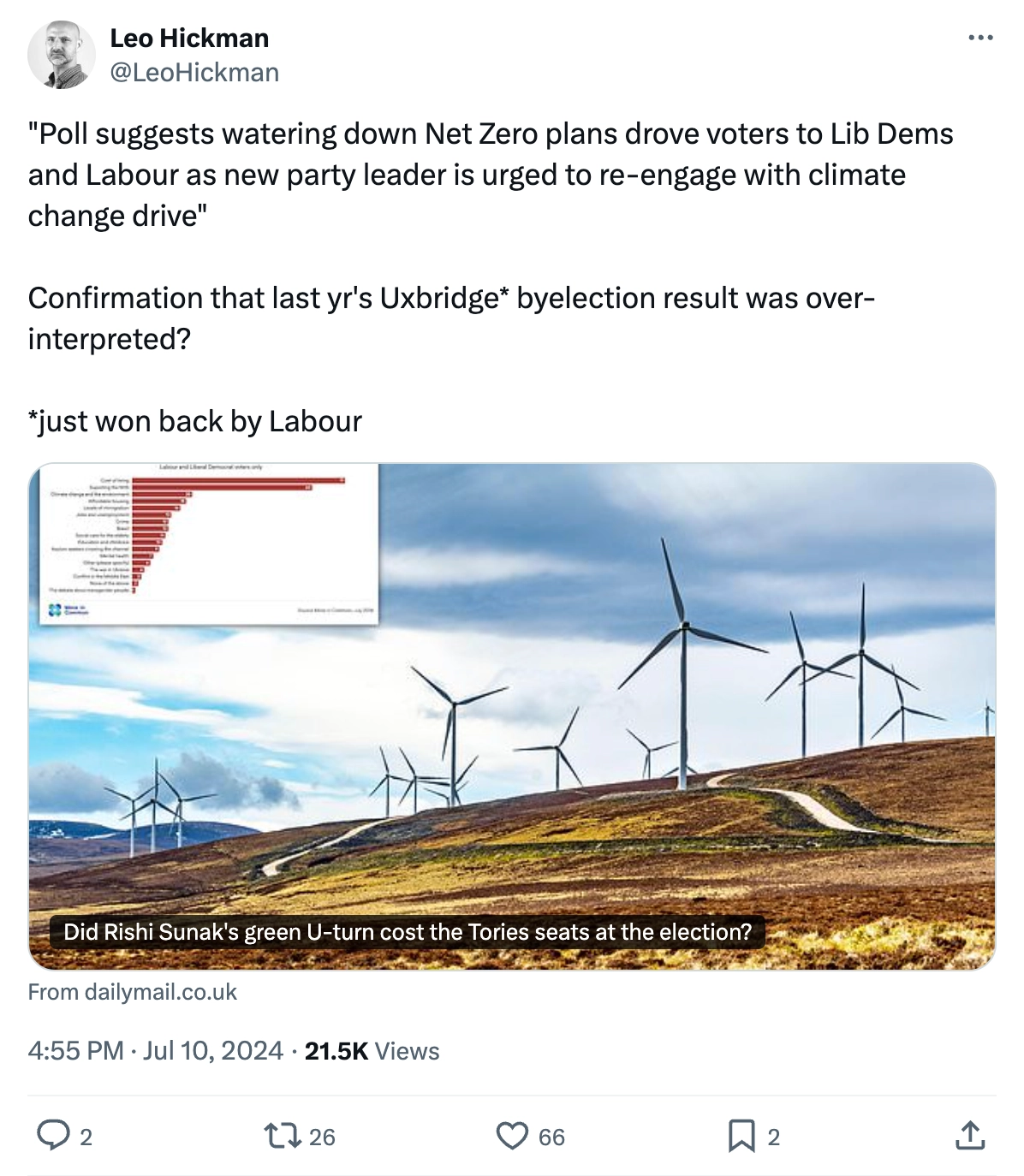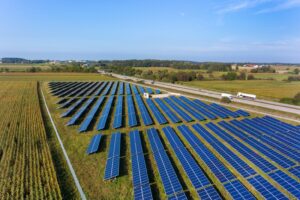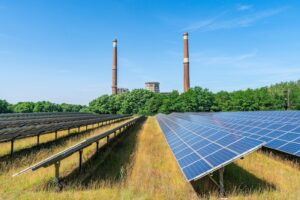The leader of the opposition Conservative party, Kemi Badenoch, has shattered the political consensus on climate change in a speech attacking the UK’s net-zero by 2050 target.
In a speech launching a “policy renewal programme” to shape the Conservatives’ approach to key issues, Badenoch disowned the target passed into law by her own party in 2019.
She offered no alternative to the 2050 net-zero target and failed to cite any evidence in support of her assertion that meeting it would be “impossible” without “bankrupting” the country.
As a government minister in 2022, Badenoch had touted the “opportunity” for “growth and revitalised communities” as a result of the “clean energy revolution”.
However, she then ran her leadership campaign as a “net-zero sceptic” from the home of Neil Record, the chair of the UK’s main climate-sceptic lobby group Net Zero Watch.
Her speech received widespread media coverage, including frontpage stories for the Daily Mail, the Times and the Daily Telegraph, as well as editorials from the Daily Telegraph and the Sun.
In this factcheck, Carbon Brief looks at the evidence on the UK’s net-zero target and how it contradicts the claims made by Badenoch in her speech.
- Net-zero is ‘the only way’ to stop global warming
- Net-zero by 2050 in the UK is ‘feasible’ and ‘affordable’
- The UK has a ‘delivery plan’ to meet its climate goals
- Reaching net-zero will be ‘73% cheaper than thought’
- Unchecked warming would be ‘catastrophic’ for public finances
- High gas prices are making energy bills expensive
- Net-zero will ‘make energy cheaper, not more costly’
- Net-zero makes energy ‘more secure’
- Two-thirds of UK public backs net-zero by 2050
- More than 80% of world’s population covered by net-zero targets
Net-zero is ‘the only way’ to stop global warming
In her speech, Badenoch claimed that she was committed to “safeguard[ing] the delicate balance of nature for future generations” and that she was offering “three truths” about net-zero.
Yet she also falsely claimed that “no one knows” why the UK has a net-zero by 2050 target.
The Intergovernmental Panel on Climate Change (IPCC) has detailed the extensive evidence that it will be impossible to stop global warming without reaching net-zero.
In its latest assessment report, the IPCC explained:
“Without net-zero CO2 emissions, and a decrease in the net non-CO2 forcing (or sufficient net negative CO2 emissions to offset any further warming from net non-CO2 forcing), the climate system will continue to warm.”
Speaking at the report launch, IPCC Working Group I co-chair Dr Valérie Masson-Delmotte said reaching net-zero emissions was the “only way to limit global warming”. She said:
“This report reaffirms that there is a near-linear relationship between the cumulative amount of emissions of CO2 in the atmosphere from human activities and the extent of observed and future warming. This is physics. This means that the only way to limit global warming is to reach net-zero CO2 emissions at the global scale. Every additional tonne of CO2 emissions adds to global warming.”
This is why the 2015 Paris Agreement, signed by almost every country in the world, targets a “balance” between greenhouse gas sources and the “sinks” that remove them from the atmosphere .
The IPCC also explained that limiting warming by the end of the century to less than 1.5C above pre-industrial levels would require emissions to reach net-zero globally by the “early 2050s”.
In 2019, the UK’s advisory Climate Change Committee (CCC) considered the breadth of scientific evidence, the economics of the transition, as well as societal and technological trends when it offered detailed advice – covering 277 pages – on setting a net-zero by 2050 target.
This advice formed the basis for the then-Conservative government’s decision to put the net-zero target into law, by amending the UK’s 2050 target under the 2008 Climate Change Act from an 80% reduction in emissions to a 100% goal.
With the academies of other G7 nations, the UK’s Royal Society set out the “need” for countries to “carefully design, plan and accelerate action to reach net-zero by 2050 or earlier”. It said:
“Science tells us we must act now and continue to act into the future to deliver net-zero emissions if we are to avoid unacceptable warming.”
When she signed the net-zero target into law in 2019, former Conservative prime minister Theresa May said that the goal was “a conservative mission to end our contribution to climate change and build a more prosperous and resilient economy”.
Net-zero by 2050 in the UK is ‘feasible’ and ‘affordable’
Despite the clear evidence of the need to reach net-zero emissions to stop global warming, Badenoch said in her speech that reaching the target by 2050 was “impossible”.
She did not offer any evidence to support this supposedly “unvarnished truth”.
Announcing the adoption of the target in 2019, Conservative then-secretary of state Greg Clark said that it was “necessary and feasible”, pointing to the CCC’s advice as evidence.
Indeed, the 2019 advice set out in detail how it would be “feasible” to cut UK emissions to net-zero by 2050. In its latest advice to the government, the CCC set out a “balanced pathway” to net-zero by 2050 that showed the target was “feasible and deliverable”.
Similarly, in 2024 the National Energy System Operator (NESO) published three “credible” and “affordable” pathways to net-zero by 2050, as part of its annual “future energy scenarios”. It said:
“Our net-zero pathways identify three credible, strategic routes to reach net-zero…Decisive action is needed within the next two years to deliver the fundamental change required for a fair, affordable, sustainable and secure net-zero energy system by 2050.”
A peer-reviewed research paper in 2022 identified and compared seven pathways to net-zero by 2050, published by four different organisations.
Directly contradicting Badenoch’s speech, the study concluded that “the breadth of pathways analysed in this paper has shown that there are several possible routes to net-zero”.
Moreover, the Conservative government in 2021 published its own strategy for reaching net-zero by 2050, including an entire section titled “why net-zero”.
In a foreword to the 2021 strategy, then-Conservative prime minister Boris Johson wrote that “reaching net-zero is entirely possible”.
An updated 2023 strategy published under Conservative prime minister Rishi Sunak – when Badenoch was secretary of state for business and trade – says that “the transition to net-zero will provide the economic opportunity of the 21st century”.
At a global level, the International Energy Agency (IEA) has published a pathway “for the global energy sector to achieve net-zero CO2 [carbon dioxide] emissions by 2050, with advanced economies reaching net-zero emissions in advance of others”.
In addition to meeting global climate goals, the IEA’s pathway also meets “key energy-related sustainable development goals (SDGs), in particular universal energy access by 2030 and major improvements in air quality”.
Numerous other global pathways showing how to reach net-zero emissions by or around 2050 have been published, as summarised by the IPCC’s latest assessment report.
The UK has a ‘delivery plan’ to meet its climate goals
Another of the ideas promoted in Badenoch’s speech is that there has “never, ever been a detailed plan” to reach net-zero or other UK climate goals.
This is flatly contradicted by the extensive legislative and policy framework set up around UK climate targets under the 2008 Climate Change Act.
This legislation requires the government to seek and take into account the CCC’s advice on how to reach net-zero. It also requires the government, under sections 13 and 14 of the act, to prepare and publish “proposals and policies” that “will enable” the UK’s legally binding targets to be met.
The UK’s 2021 strategy was subject to legal challenge and was subsequently ruled unlawful for failing to publicly spell out the ways it would cut UK emissions, policy by policy.
However, these numbers – quantifying the impact of each policy to cut emissions – had always been available behind the scenes. They were later published as part of a revised, highly detailed “delivery plan” for meeting the UK’s goals.
Indeed, it was published in 2023 alongside a veritable “avalanche” of plans and policies, amounting to nearly 3,000 pages of documents on how the UK was going about cutting its emissions.
While this revised strategy was later ruled unlawful once again, it is hard to argue that there has “never, ever been a detailed plan”.
The Labour government has until May 2025 to submit a revised delivery plan to the high court.
Reaching net-zero will be ‘73% cheaper than thought’
In addition to claiming that there is no plan for reaching net-zero, Badenoch claimed that this fictional absence is because it “would reveal just how catastrophic the actual costs will be for families, for businesses and for our economy”.
Badenoch also claimed falsely that reaching net-zero would be a “multi-trillion” project and that it could only be reached by “bankrupting us”. She said:
“Anyone who has done any serious analysis knows it cannot be achieved without a significant drop in our living standards or worse, by bankrupting us.”
Her speech follows a wave of “scary-sounding numbers” being thrown around the UK debate about net-zero over the past 18 months.
Invariably, these arguments – and the numbers behind them – focus on the costs of reaching net-zero without mentioning the costs of business-as-usual; look at the cost of cutting emissions, but not the benefits; or ignore the costs of failing to tackle climate change.
On the contrary, the only “serious analysis” – as Badenoch quipped – on the economic impact of the UK’s net-zero target, has found that meeting the goal will require significant, but affordable investments, which will deliver long-term savings in terms of lower bills for importing fossil fuels.
Badenoch herself, while a minister in 2022, touted the “opportunity, growth and revitalised communities” offered by “the clean energy revolution”, which she said was the “future-proofing force that will help us create a better tomorrow”.
Her comments echoed the independent review commissioned by the government she was part of at the time, which concluded that net-zero was the “growth opportunity of the 21st century”.
It added that while significant investments would be needed – primarily from the private sector – the “benefits of investing in net-zero today outweigh the costs”.
Similarly, in its latest advice to the government, the CCC concluded that the UK would need to make additional investments totalling less than £700bn over the 25 years to 2050.
This was significantly lower than the £1.3tn estimate published just five years earlier and several times lower than the “multi-trillion” cost claimed by Badenoch.
Those investments would deliver almost equally large operational savings of £600bn, due to more efficient electrified heat, transport and industry needing less fossil fuel imports.
In total, the CCC therefore estimated that the net cost of reaching net-zero would amount to just over £100bn over 25 years, equivalent to £4bn per year or 0.2% of GDP.

This £100bn net cost is 73% lower than the CCC’s estimate from five years earlier, Carbon Brief analysis found.
Moreover, the CCC said that the large majority of the investment required – some 65-90% – would come from the private sector, rather than from government coffers.
In a statement responding to Badenoch’s speech, Dhara Vyas, the head of Energy UK agreed on the need for “honest conversations”, but added that delaying investments “increases the eventual cost” and – as per Carbon Brief analysis – had already “added billions to bills”. She said:
“Of course we need honest conversations about how we fund the costs in a way that is fair to households and businesses – and this also needs to include a consideration of the potential price of inaction. Delaying upfront investment increases the eventual cost and rowing back on green measures added billions to bills during the gas crisis.”
Unchecked warming would be ‘catastrophic’ for public finances
Badenoch’s speech did not mention the costs of unchecked warming. Instead, she described the UK’s approach to climate policy as “fantasy politics…Promising the Earth. And costing it too.”
In contrast, the Office for Budget Responsibility (OBR) concluded in 2021: “Unmitigated climate change would ultimately have catastrophic economic and fiscal consequences.”
This was, in part, due to the impact of increasingly severe extreme weather events, which the OBR subsequently said might cost the UK nearly 8% of GDP by 2050.
The conclusion was also based on the fact that shifting to clean energy would reduce the UK’s exposure to volatile fossil fuel prices set by international markets. It said:
“There is a risk that the UK economy remains relatively highly dependent on imported gas…Continued dependence on gas could be as expensive fiscally as completing the transition to net-zero”.
Furthermore, the OBR found that delaying action “could double the overall cost” to the UK of cutting emissions to net-zero.
In its own 2021 review of the net-zero target, the Treasury under Rishi Sunak said that unchecked climate change would be a “significant fiscal risk” and that while the transition to net-zero would have “material fiscal consequences”, those consequences could be “managed”. It added:
“Furthermore, the increased investment required to transition to net-zero creates opportunities for growth and employment.”
This is illustrated by a February 2025 report from the Confederation for British Industry (CBI), which concluded that net-zero was making a “growing contribution” to the UK economy. It said:
“Think going green is just a nice idea? Think again. The net-zero economy has become a powerhouse of job creation and economic expansion with 10.1% growth in the total economic value supported by the net-zero economy since 2023.”
The report found that the net-zero economy was growing three times faster than other sectors. Responding to Badenoch’s speech, CBI head Rain Newton-Smith said in a statement:
“Now is not the time to step back from the opportunities of the green economy. Cross-party support for net-zero has underpinned international investors’ confidence to choose the UK for investment in the energy transition.”
High gas prices are making energy bills expensive
Part of Badenoch’s argument against the net-zero target is her claim that the UK’s current climate policies are “driving up the cost of energy”. In her speech, she said:
“The cost of electricity – far too high – much higher than nearby and comparative countries with the real possibility of it going even higher with environmental levies.”
The UK does face very high electricity prices relative to many other countries. However, contrary to Badenoch’s speech, the UK’s extreme exposure to gas prices is the main reason for this.
(As Energy UK’s Vyas notes in her statement, “it’s the volatile cost of fossil fuels and our dependence on them that have driven up energy bills for customers”.)
Indeed, the UK’s wholesale electricity prices are almost entirely dictated by the price of gas, which remains more than three times more expensive than before the global energy crisis.
This near-perfect correlation between gas and power prices is shown in the figure below. (Note that Northern Ireland is part of the separate all-Ireland electricity market.)
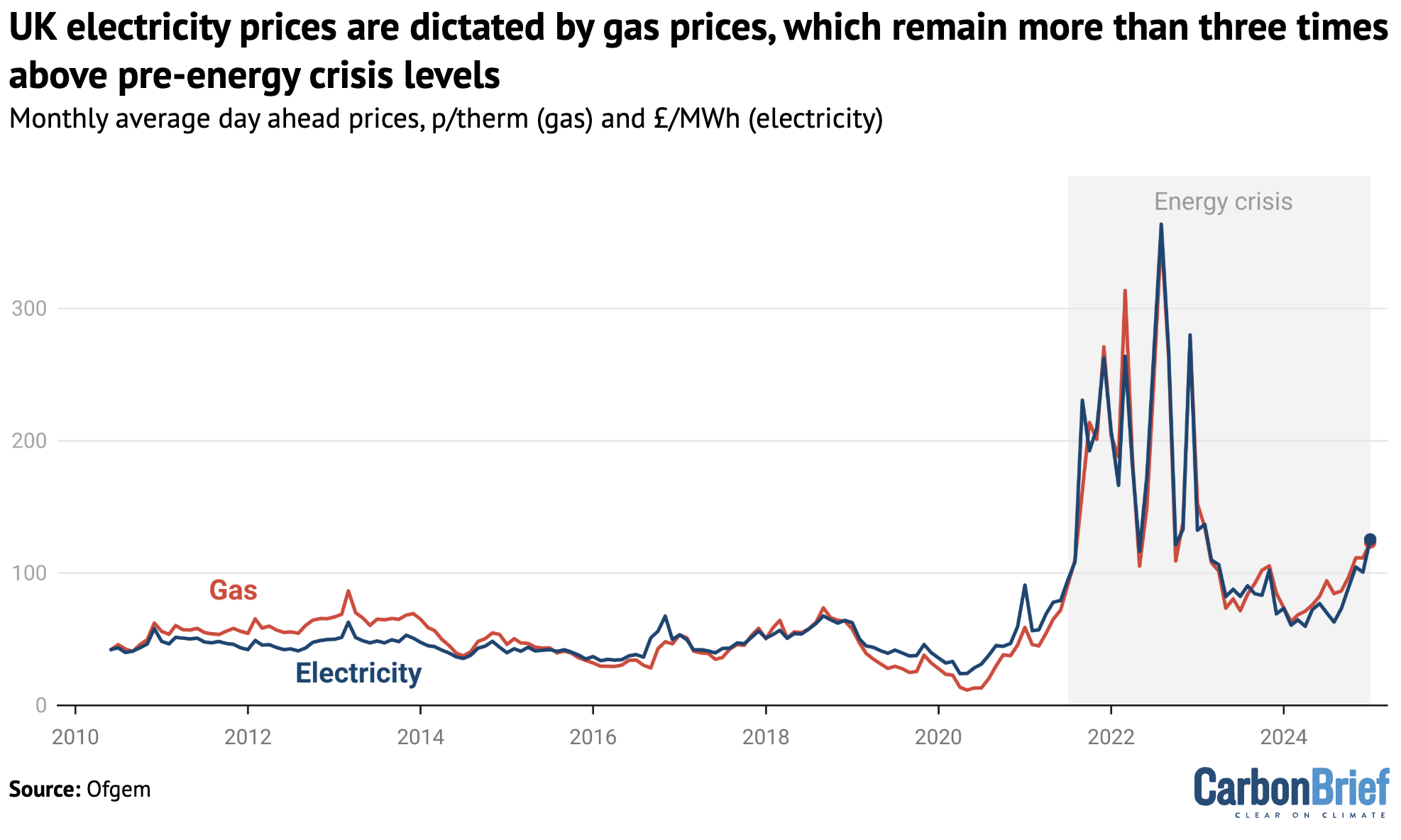
While the UK’s electricity was the “cleanest ever” in 2024, with a record-low share coming from fossil fuels, gas continues to set the price of electricity during the vast majority of hours.
This is a result of the “marginal pricing” system used in most countries around the world. Specifically, gas sets the wholesale price of electricity in the UK during 98% of hours, whereas the EU average is less than 40%, as shown in the figure below.
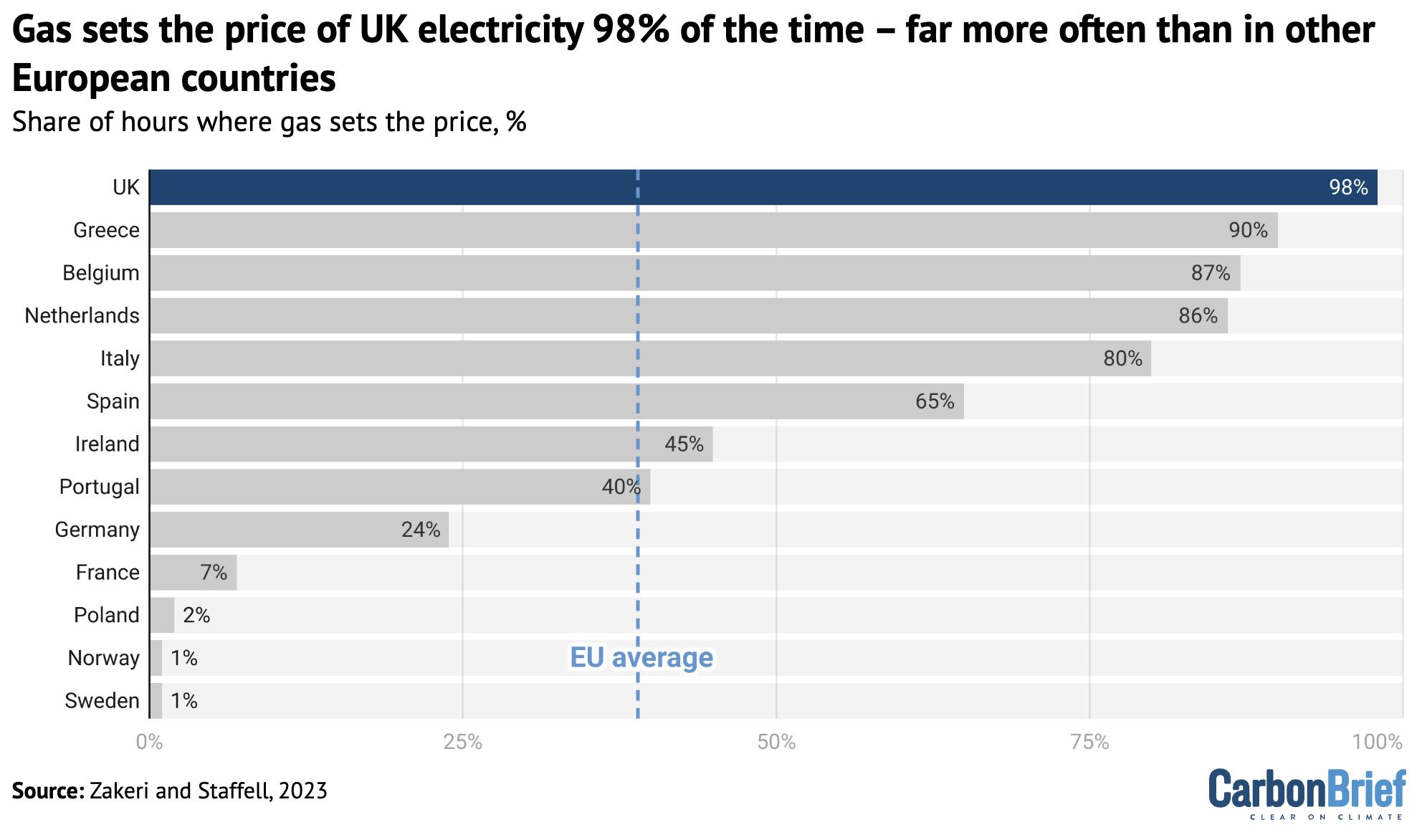
The government’s target of clean power by 2030 is expected to significantly reduce the amount of time when gas sets the price of electricity.
In one of the scenarios set out in NESO advice last autumn, gas would set the price in just 15% of hours by 2030, insulating consumers from “volatile international gas prices”.
While the UK’s high exposure to gas prices is the main reason for high electricity bills, the government is also under pressure to cut other costs, including the cost of building and operating the electricity system, as well as funding historical support for renewable projects.
A long-running government review of the way the electricity market operates is due to reach a conclusion by summer 2025. This could result in changes designed to reduce the influence of gas on electricity prices and to make the system more efficient, among other things.
In a March 2025 report, Energy UK set out a range of shorter-term options to cut the price of electricity, most prominently removing policy costs from electricity bills and paying them via gas bills or from general taxation. This shifting of costs is known as “rebalancing”.
The CCC’s recent advice to government also called for policy costs – which make up around 25% of household electricity prices – to be rebalanced onto gas bills or taxation.
Net-zero will ‘make energy cheaper, not more costly’
In the longer term – and contrary to what Badenoch implies in her speech – the transition to clean energy is widely expected to cut household energy costs.
Looking specifically at the UK, the CCC said in February 2025 that shifting towards net-zero would help cut household energy bills and motoring costs by £1,400 per year by 2050.
It said that household energy bills for heat and power would fall by £700 in 2050, compared with current levels, and that the cost of fuelling cars would fall by a similar amount.
In a pre-launch press briefing, CCC chief executive Emma Pinchbeck addressed MPs arguing against the transition to net-zero, telling journalists that their opposition amounted to being hostile to lower bills for their constituents. She said:
“If you are an elected representative who is hostile to renewables, heat pumps, electric vehicles, what our numbers say is you are also hostile to your constituents saving £700 on their energy bill and [another] £700 on their fuel bill through making those changes.”
At a global level, the IEA concluded that reaching net-zero by 2050 would “make energy cheaper, not more costly”.
Strikingly, the IEA concluded that accelerating climate action to reach net-zero emissions by 2050 would make the global energy system “more affordable and fairer”.
According to the agency, this is because higher investment costs would be more than offset by lower fuel bills, greater efficiency and reduced fossil fuel rents. It concluded:
“Energy transitions could lead to major reductions in household energy bills and accelerate progress towards universal energy access. But managing upfront costs for poorer and rural households – as well as ongoing costs – remains a key public policy challenge.”
Net-zero makes energy ‘more secure’
Another key part of Badenoch’s speech was her argument that net-zero “makes us dangerously dependent on countries who don’t share our values and it is risking our energy security”.
She did not find space in her speech to mention the UK’s current exposure to expensive fossil fuel imports, many of which come from what she refers to as “countries who don’t share our values”.
Indeed, the UK’s exposure to international gas prices, which surged following Russia’s invasion of Ukraine in 2022, left the country the “worst hit” in western Europe by the subsequent global energy crisis, according to Guardian coverage of a report from the International Monetary Fund.
The government’s target to shift to clean power by 2030 would leave the country “much less reliant on energy imports for power and far less exposed to fluctuations in international gas prices”, according to NESO advice published last November.
The wider shift away from fossil fuels, towards electrified heat and transport, would mean the UK could cut its oil imports tenfold from current levels by 2050 and its gas imports by two-thirds, according to the CCC’s recently published pathway to net-zero.
While Badenoch said that she, too, supported the shift to renewables “when they make energy cheaper and more secure”, she also claimed that they would leave the UK “heavily dependent on China”. The country currently manufactures most of the world’s solar panels and large proportions of the batteries and other clean technologies needed to decarbonise.
The shift away from fossil fuels towards clean energy will indeed reshape the geopolitics of global energy supplies. However, Badenoch omits the fundamentally different nature of buying an electric vehicle, which can be fuelled with domestically produced electricity, compared with a petrol car, for which imported fuel must be bought, burned and then bought again and again.
In its 2023 energy security strategy, the then-Conservative government said that the shift to clean energy was the “most effective route to ensuring both climate and energy security”, which would help “avoid risks associated with dependency on fossil fuels”.
Two-thirds of UK public backs net-zero by 2050
In its coverage of Badenoch’s speech, Bloomberg reports that her positioning on net-zero is an attempt to win back votes lost to the hard-right, climate-sceptic Reform UK party.
Ever since the Uxbridge byelection in July 2023, the Conservatives had been tacking away from their historical support for climate policies in general and the net-zero target in particular.
This shift saw then-prime minister Rishi Sunak make a September 2023 speech in which he abandoned or delayed key parts of the then-government’s climate strategy.
Using similar language to Badenoch’s speech, Sunak said at the time that he was adopting an “honest” approach to net-zero and that he was going to remove “unacceptable costs” from “hard-working British people”. Several of his changes would have cost consumers billions.
Many political observers noted at the time that this approach carried electoral risks for the Conservatives. Even some within the party argued that the “right lessons” needed to be drawn from the Uxbridge result. Yet Badenoch has doubled down, going even further than Sunak.
This is despite the fact that anti net-zero rhetoric from the Conservatives was reportedly at least partly to blame for their loss in last year’s general election.
Indeed, some 65%% of the UK public backs the net-zero by 2050 target, according to polling by Climate Barometer, compared with 22% who oppose it.
Moreover, 55% of Conservative voters back the target, as well as 90% of MPs.
YouGov polling released on the day of Badenoch’s speech found that 61% of people in Great Britain support net-zero and just 24% oppose it.
Among those who voted Conservative in the last election 52% support the goal and 38% oppose it, according to the YouGov results.
More than 80% of world’s population covered by net-zero targets
One final point raised by Badenoch’s speech is that even if the UK were to reach net-zero, global emissions would not be guaranteed to reach net-zero overall.
She went on to claim that “other countries are not following us”. Contrary to this claim, some 142 countries – representing more than 80% of the world’s population – are covered by net-zero targets.
The post Factcheck: Why Conservative leader Kemi Badenoch is wrong about UK’s net-zero goal appeared first on Carbon Brief.
Factcheck: Why Conservative leader Kemi Badenoch is wrong about UK’s net-zero goal
Greenhouse Gases
DeBriefed 27 February 2026: Trump’s fossil-fuel talk | Modi-Lula rare-earth pact | Is there a UK ‘greenlash’?
Welcome to Carbon Brief’s DeBriefed.
An essential guide to the week’s key developments relating to climate change.
This week
Absolute State of the Union
‘DRILL, BABY’: US president Donald Trump “doubled down on his ‘drill, baby, drill’ agenda” in his State of the Union (SOTU) address, said the Los Angeles Times. He “tout[ed] his support of the fossil-fuel industry and renew[ed] his focus on electricity affordability”, reported the Financial Times. Trump also attacked the “green new scam”, noted Carbon Brief’s SOTU tracker.
COAL REPRIEVE: Earlier in the week, the Trump administration had watered down limits on mercury pollution from coal-fired power plants, reported the Financial Times. It remains “unclear” if this will be enough to prevent the decline of coal power, said Bloomberg, in the face of lower-cost gas and renewables. Reuters noted that US coal plants are “ageing”.
OIL STAY: The US Supreme Court agreed to hear arguments brought by the oil industry in a “major lawsuit”, reported the New York Times. The newspaper said the firms are attempting to head off dozens of other lawsuits at state level, relating to their role in global warming.
SHIP-SHILLING: The Trump administration is working to “kill” a global carbon levy on shipping “permanently”, reported Politico, after succeeding in delaying the measure late last year. The Guardian said US “bullying” could be “paying off”, after Panama signalled it was reversing its support for the levy in a proposal submitted to the UN shipping body.
Around the world
- RARE EARTHS: The governments of Brazil and India signed a deal on rare earths, said the Times of India, as well as agreeing to collaborate on renewable energy.
- HEAT ROLLBACK: German homes will be allowed to continue installing gas and oil heating, under watered-down government plans covered by Clean Energy Wire.
- BRAZIL FLOODS: At least 53 people died in floods in the state of Minas Gerais, after some areas saw 170mm of rain in a few hours, reported CNN Brasil.
- ITALY’S ATTACK: Italy is calling for the EU to “suspend” its emissions trading system (ETS) ahead of a review later this year, said Politico.
- COOKSTOVE CREDITS: The first-ever carbon credits under the Paris Agreement have been issued to a cookstove project in Myanmar, said Climate Home News.
- SAUDI SOLAR: Turkey has signed a “major” solar deal that will see Saudi firm ACWA building 2 gigawatts in the country, according to Agence France-Presse.
$467 billion
The profits made by five major oil firms since prices spiked following Russia’s invasion of Ukraine four years ago, according to a report by Global Witness covered by BusinessGreen.
Latest climate research
- Claims about the “fingerprint” of human-caused climate change, made in a recent US Department of Energy report, are “factually incorrect” | AGU Advances
- Large lakes in the Congo Basin are releasing carbon dioxide into the atmosphere from “immense ancient stores” | Nature Geoscience
- Shared Socioeconomic Pathways – scenarios used regularly in climate modelling – underrepresent “narratives explicitly centring on democratic principles such as participation, accountability and justice” | npj Climate Action
(For more, see Carbon Brief’s in-depth daily summaries of the top climate news stories on Monday, Tuesday, Wednesday, Thursday and Friday.)
Captured
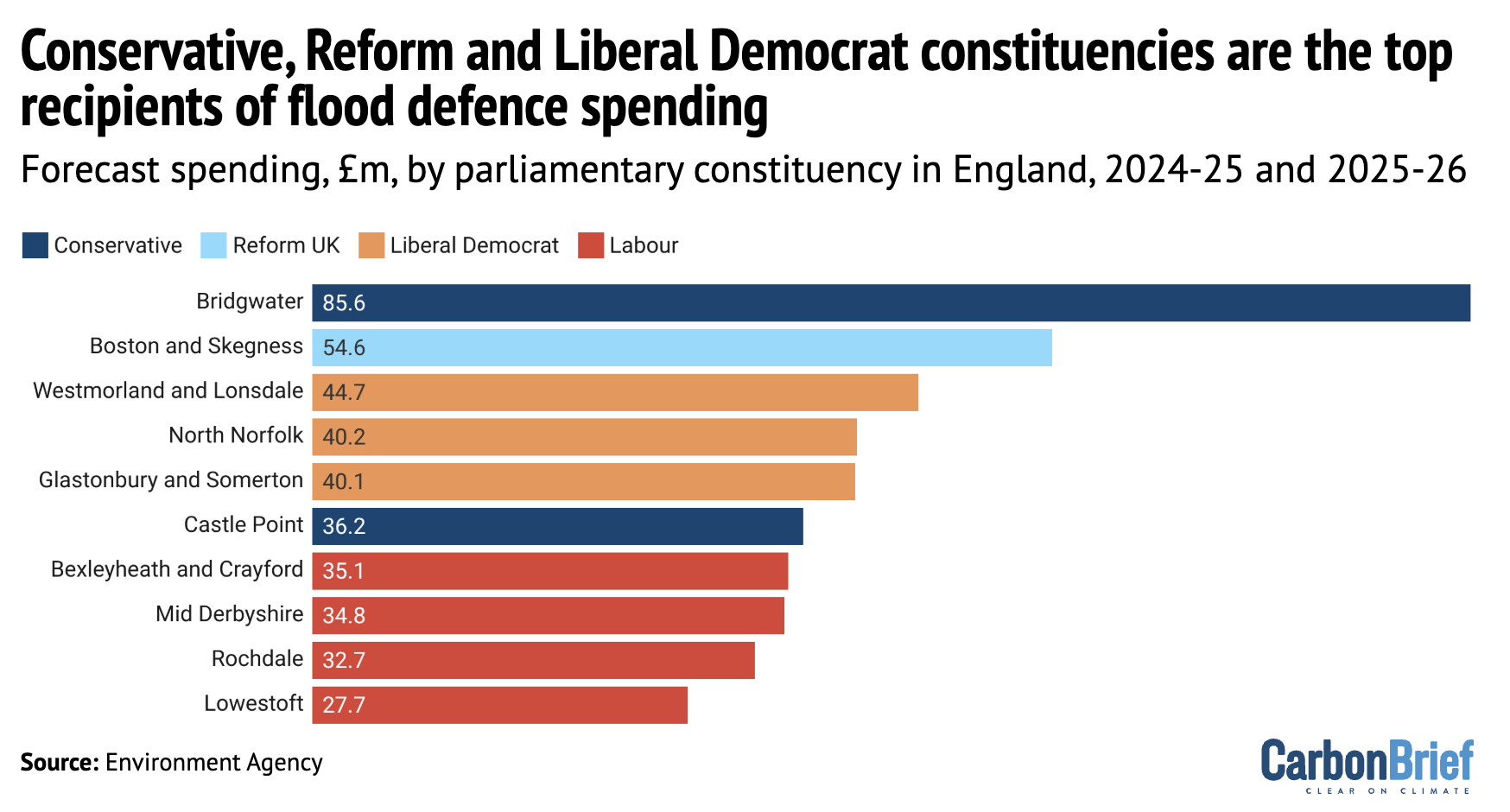
The constituency of Richard Tice MP, the climate-sceptic deputy leader of Reform UK, is the second-largest recipient of flood defence spending in England, according to new Carbon Brief analysis. Overall, the funding is disproportionately targeted at coastal and urban areas, many of which have Conservative or Liberal Democrat MPs.
Spotlight
Is there really a UK ‘greenlash’?
This week, after a historic Green Party byelection win, Carbon Brief looks at whether there really is a “greenlash” against climate policy in the UK.
Over the past year, the UK’s political consensus on climate change has been shattered.
Yet despite a sharp turn against climate action among right-wing politicians and right-leaning media outlets, UK public support for climate action remains strong.
Prof Federica Genovese, who studies climate politics at the University of Oxford, told Carbon Brief:
“The current ‘war’ on green policy is mostly driven by media and political elites, not by the public.”
Indeed, there is still a greater than two-to-one majority among the UK public in favour of the country’s legally binding target to reach net-zero emissions by 2050, as shown below.
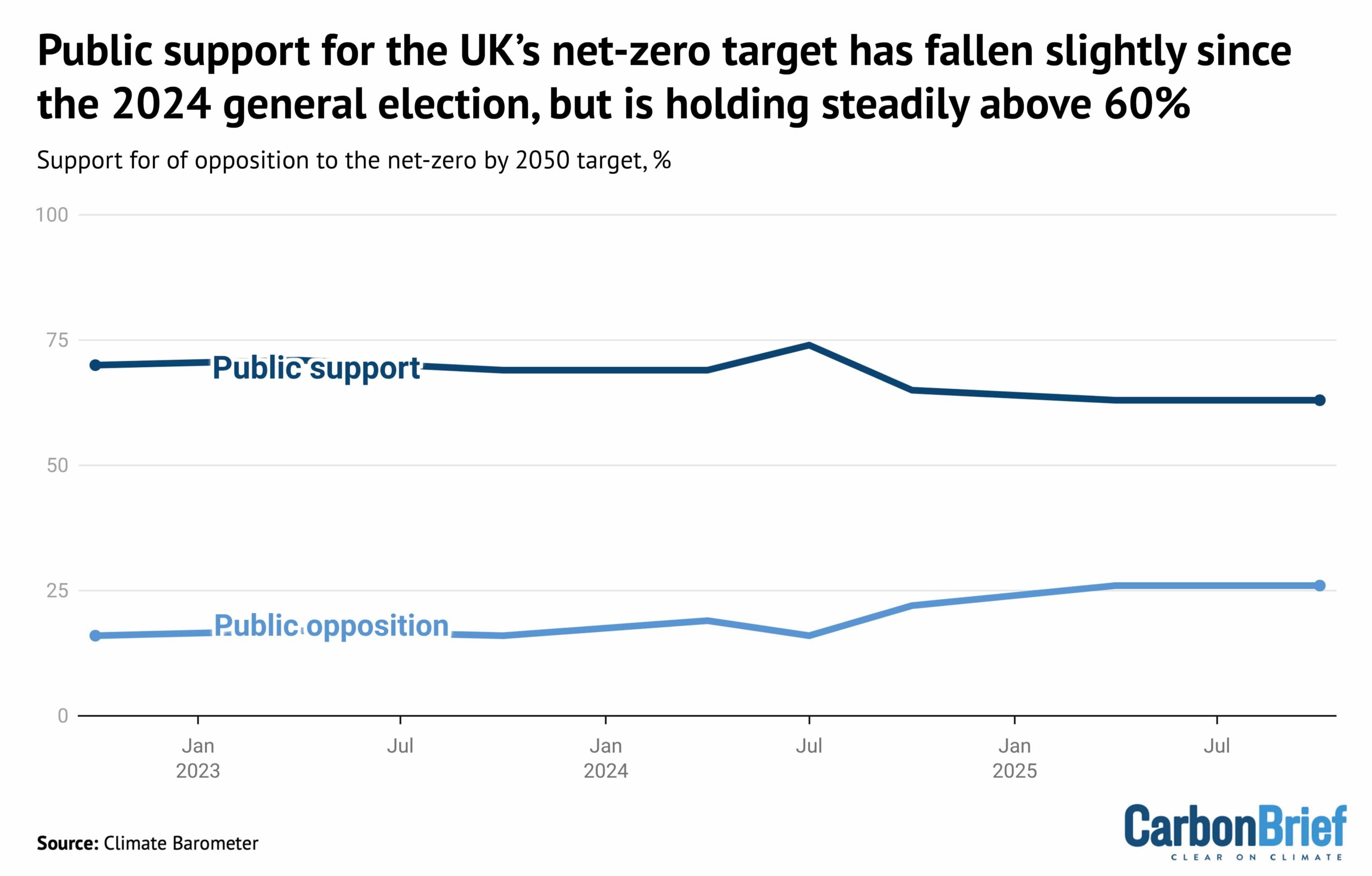
Steve Akehurst, director of public-opinion research initiative Persuasion UK, also noted the growing divide between the public and “elites”. He told Carbon Brief:
“The biggest movement is, without doubt, in media and elite opinion. There is a bit more polarisation and opposition [to climate action] among voters, but it’s typically no more than 20-25% and mostly confined within core Reform voters.”
Conservative gear shift
For decades, the UK had enjoyed strong, cross-party political support for climate action.
Lord Deben, the Conservative peer and former chair of the Climate Change Committee, told Carbon Brief that the UK’s landmark 2008 Climate Change Act had been born of this cross-party consensus, saying “all parties supported it”.
Since their landslide loss at the 2024 election, however, the Conservatives have turned against the UK’s target of net-zero emissions by 2050, which they legislated for in 2019.
Curiously, while opposition to net-zero has surged among Conservative MPs, there is majority support for the target among those that plan to vote for the party, as shown below.
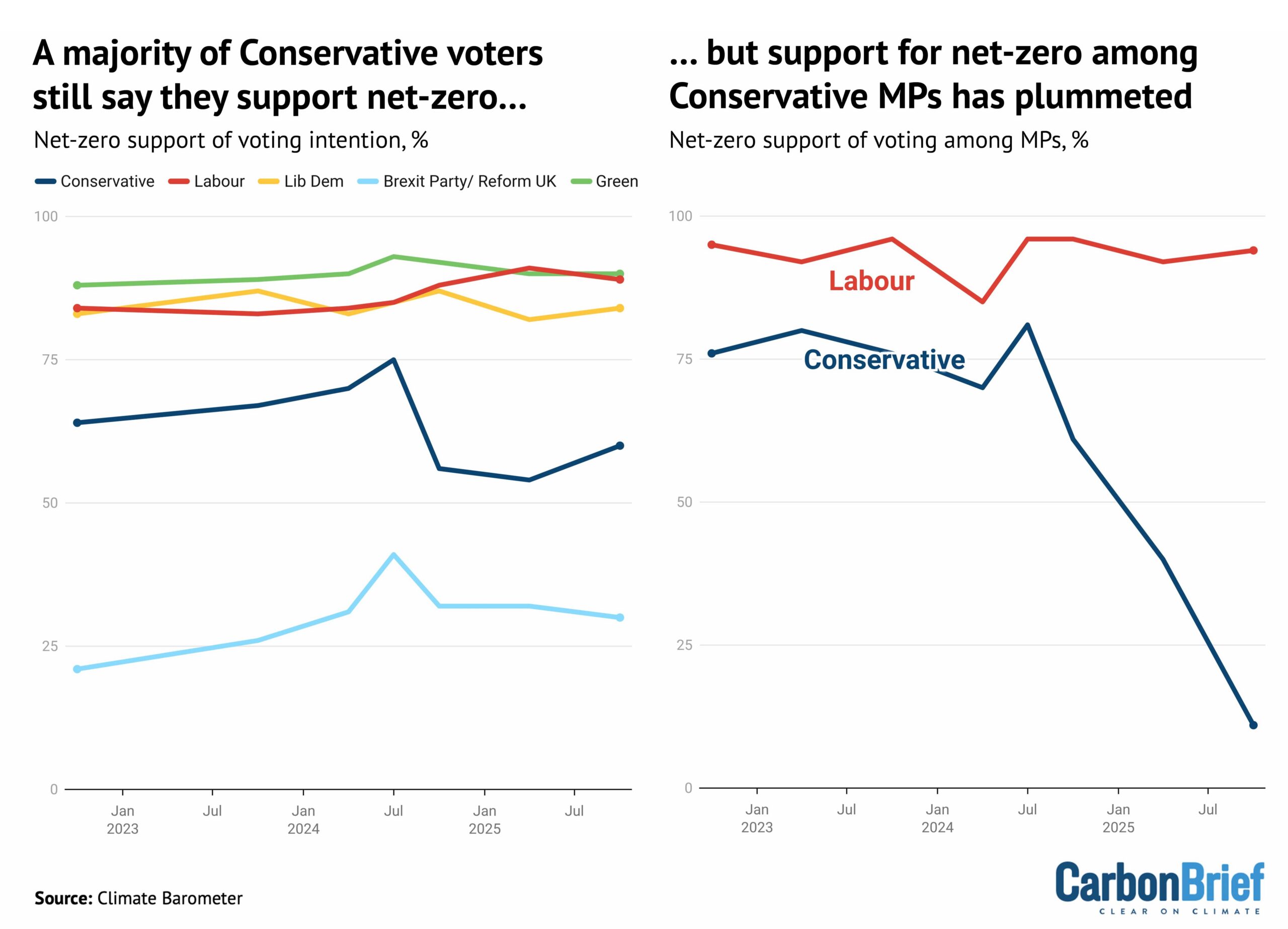
Dr Adam Corner, advisor to the Climate Barometer initiative that tracks public opinion on climate change, told Carbon Brief that those who currently plan to vote Reform are the only segment who “tend to be more opposed to net-zero goals”. He said:
“Despite the rise in hostile media coverage and the collapse of the political consensus, we find that public support for the net-zero by 2050 target is plateauing – not plummeting.”
Reform, which rejects the scientific evidence on global warming and campaigns against net-zero, has been leading the polls for a year. (However, it was comfortably beaten by the Greens in yesterday’s Gorton and Denton byelection.)
Corner acknowledged that “some of the anti-net zero noise…[is] showing up in our data”, adding:
“We see rising concerns about the near-term costs of policies and an uptick in people [falsely] attributing high energy bills to climate initiatives.”
But Akehurst said that, rather than a big fall in public support, there had been a drop in the “salience” of climate action:
“So many other issues [are] competing for their attention.”
UK newspapers published more editorials opposing climate action than supporting it for the first time on record in 2025, according to Carbon Brief analysis.
Global ‘greenlash’?
All of this sits against a challenging global backdrop, in which US president Donald Trump has been repeating climate-sceptic talking points and rolling back related policy.
At the same time, prominent figures have been calling for a change in climate strategy, sold variously as a “reset”, a “pivot”, as “realism”, or as “pragmatism”.
Genovese said that “far-right leaders have succeeded in the past 10 years in capturing net-zero as a poster child of things they are ‘fighting against’”.
She added that “much of this is fodder for conservative media and this whole ecosystem is essentially driving what we call the ‘greenlash’”.
Corner said the “disconnect” between elite views and the wider public “can create problems” – for example, “MPs consistently underestimate support for renewables”. He added:
“There is clearly a risk that the public starts to disengage too, if not enough positive voices are countering the negative ones.”
Watch, read, listen
TRUMP’S ‘PETROSTATE’: The US is becoming a “petrostate” that will be “sicker and poorer”, wrote Financial Times associate editor Rana Forohaar.
RHETORIC VS REALITY: Despite a “political mood [that] has darkened”, there is “more green stuff being installed than ever”, said New York Times columnist David Wallace-Wells.
CHINA’S ‘REVOLUTION’: The BBC’s Climate Question podcast reported from China on the “green energy revolution” taking place in the country.
Coming up
- 2-6 March: UN Food and Agriculture Organization regional conference for Latin America and Caribbean, Brasília
- 3 March: UK spring statement
- 4-11 March: China’s “two sessions”
- 5 March: Nepal elections
Pick of the jobs
- The Guardian, senior reporter, climate justice | Salary: $123,000-$135,000. Location: New York or Washington DC
- China-Global South Project, non-resident fellow, climate change | Salary: Up to $1,000 a month. Location: Remote
- University of East Anglia, PhD in mobilising community-based climate action through co-designed sports and wellbeing interventions | Salary: Stipend (unknown amount). Location: Norwich, UK
- TABLE and the University of São Paulo, Brazil, postdoctoral researcher in food system narratives | Salary: Unknown. Location: Pirassununga, Brazil
DeBriefed is edited by Daisy Dunne. Please send any tips or feedback to debriefed@carbonbrief.org.
This is an online version of Carbon Brief’s weekly DeBriefed email newsletter. Subscribe for free here.
The post DeBriefed 27 February 2026: Trump’s fossil-fuel talk | Modi-Lula rare-earth pact | Is there a UK ‘greenlash’? appeared first on Carbon Brief.
Greenhouse Gases
Analysis: Constituency of Reform’s climate-sceptic Richard Tice gets £55m flood funding
The Lincolnshire constituency held by Richard Tice, the climate-sceptic deputy leader of the hard-right Reform party, has been pledged at least £55m in government funding for flood defences since 2024.
This investment in Boston and Skegness is the second-largest sum for a single constituency from a £1.4bn flood-defence fund for England, Carbon Brief analysis shows.
Flooding is becoming more likely and more extreme in the UK due to climate change.
Yet, for years, governments have failed to spend enough on flood defences to protect people, properties and infrastructure.
The £1.4bn fund is part of the current Labour government’s wider pledge to invest a “record” £7.9bn over a decade on protecting hundreds of thousands of homes and businesses from flooding.
As MP for one of England’s most flood-prone regions, Tice has called for more investment in flood defences, stating that “we cannot afford to ‘surrender the fens’ to the sea”.
He is also one of Reform’s most vocal opponents of climate action and what he calls “net stupid zero”. He denies the scientific consensus on climate change and has claimed, falsely and without evidence, that scientists are “lying”.
Flood defences
Last year, the government said it would invest £2.65bn on flood and coastal erosion risk management (FCERM) schemes in England between April 2024 and March 2026.
This money was intended to protect 66,500 properties from flooding. It is part of a decade-long Labour government plan to spend more than £7.9bn on flood defences.
There has been a consistent shortfall in maintaining England’s flood defences, with the Environment Agency expecting to protect fewer properties by 2027 than it had initially planned.
The Climate Change Committee (CCC) has attributed this to rising costs, backlogs from previous governments and a lack of capacity. It also points to the strain from “more frequent and severe” weather events, such as storms in recent years that have been amplified by climate change.
However, the CCC also said last year that, if the 2024-26 spending programme is delivered, it would be “slightly closer to the track” of the Environment Agency targets out to 2027.
The government has released constituency-level data on which schemes in England it plans to fund, covering £1.4bn of the 2024-26 investment. The other half of the FCERM spending covers additional measures, from repairing existing defences to advising local authorities.
The map below shows the distribution of spending on FCERM schemes in England over the past two years, highlighting the constituency of Richard Tice.
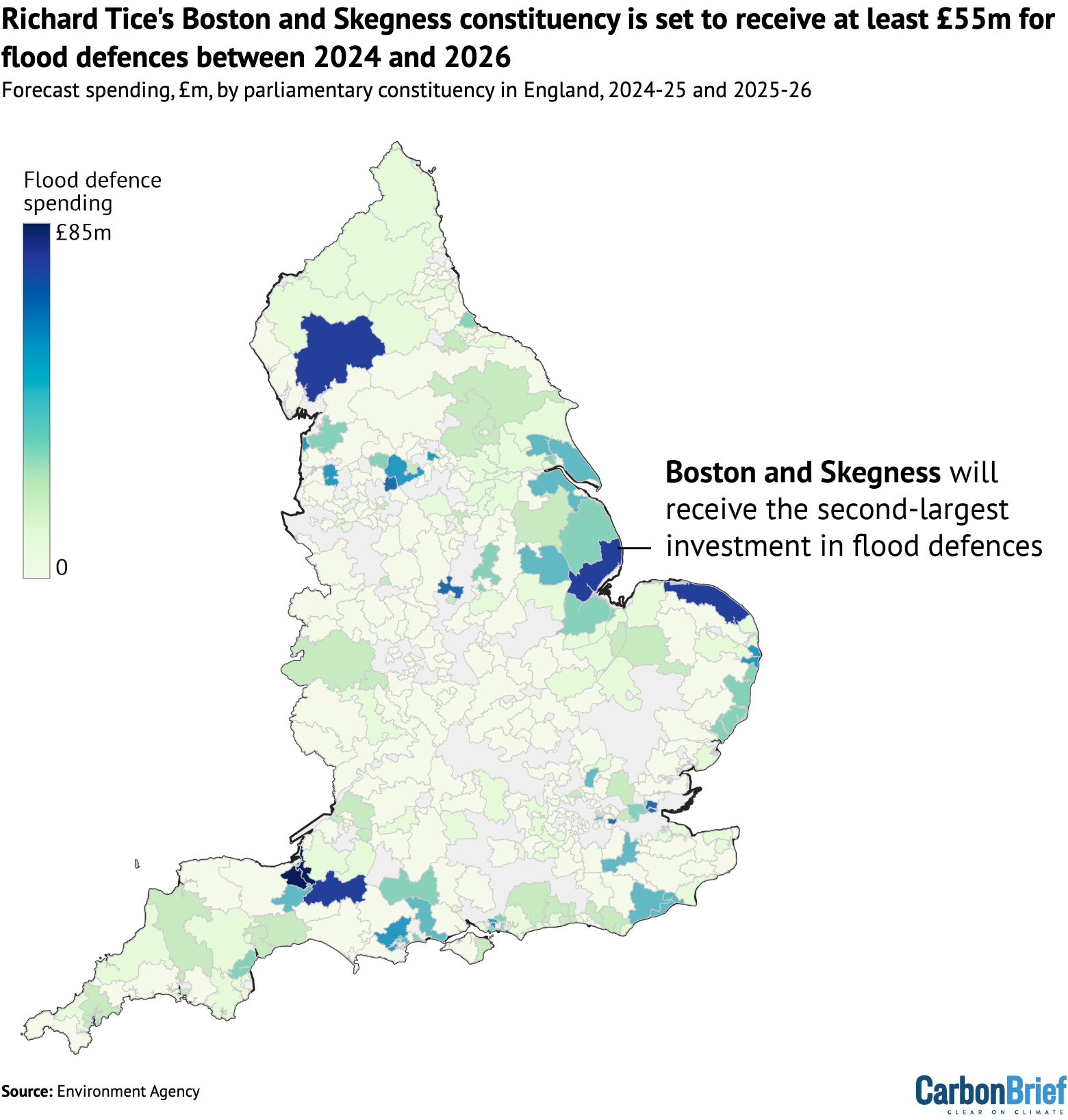
By far the largest sum of money – £85.6m in total – has been committed to a tidal barrier and various other defences in the Somerset constituency of Bridgwater, the seat of Conservative MP Ashley Fox.
Over the first months of 2026, the south-west region has faced significant flooding and Fox has called for more support from the government, citing “climate patterns shifting and rainfall intensifying”.
He has also backed his party’s position that “the 2050 net-zero target is impossible” and called for more fossil-fuel extraction in the North Sea.
Tice’s east-coast constituency of Boston and Skegness, which is highly vulnerable to flooding from both rivers and the sea, is set to receive £55m. Among the supported projects are beach defences from Saltfleet to Gibraltar Point and upgrades to pumping stations.
Overall, Boston and Skegness has the second-largest portion of flood-defence funding, as the chart below shows. Constituencies with Conservative and Liberal Democrat MPs occupied the other top positions.
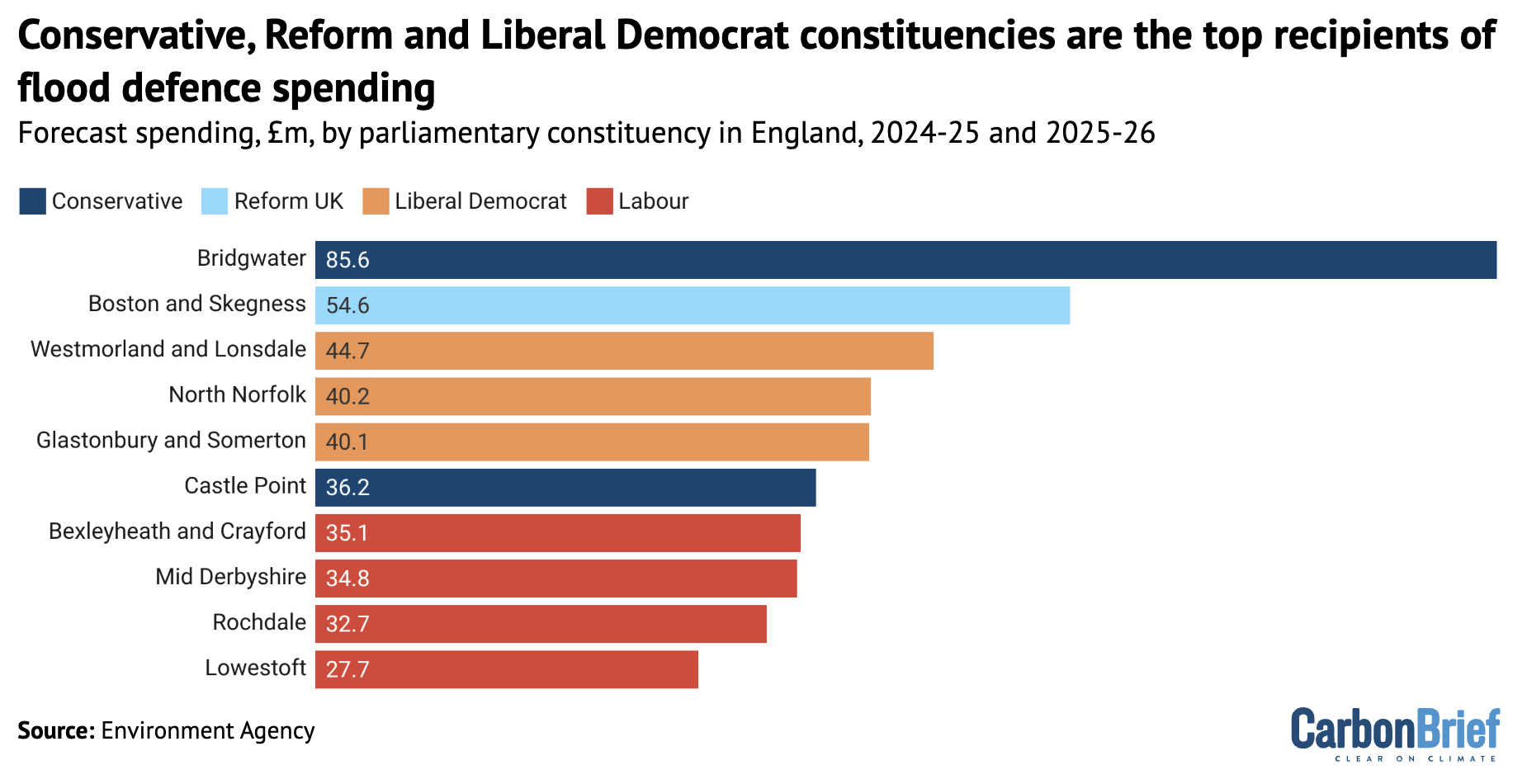
Overall, despite Labour MPs occupying 347 out of England’s 543 constituencies – nearly two-thirds of the total – more than half of the flood-defence funding was distributed to constituencies with non-Labour MPs. This reflects the flood risk in coastal and rural areas that are not traditional Labour strongholds.
Reform funding
While Reform has just eight MPs, representing 1% of the population, its constituencies have been assigned 4% of the flood-defence funding for England.
Nearly all of this money was for Tice’s constituency, although party leader Nigel Farage’s coastal Clacton seat in Kent received £2m.
Reform UK is committed to “scrapping net-zero” and its leadership has expressed firmly climate-sceptic views.
Much has been made of the disconnect between the party’s climate policies and the threat climate change poses to its voters. Various analyses have shown the flood risk in Reform-dominated areas, particularly Lincolnshire.
Tice has rejected climate science, advocated for fossil-fuel production and criticised Environment Agency flood-defence activities. Yet, he has also called for more investment in flood defences, stating that “we cannot afford to ‘surrender the fens’ to the sea”.
This may reflect Tice’s broader approach to climate change. In a 2024 interview with LBC, he said:
“Where you’ve got concerns about sea level defences and sea level rise, guess what? A bit of steel, a bit of cement, some aggregate…and you build some concrete sea level defences. That’s how you deal with rising sea levels.”
While climate adaptation is viewed as vital in a warming world, there are limits on how much societies can adapt and adaptation costs will continue to increase as emissions rise.
The post Analysis: Constituency of Reform’s climate-sceptic Richard Tice gets £55m flood funding appeared first on Carbon Brief.
Analysis: Constituency of Reform’s climate-sceptic Richard Tice gets £55m flood funding
Greenhouse Gases
Cropped 25 February 2026: Food inflation strikes | El Niño looms | Biodiversity talks stagnate
We handpick and explain the most important stories at the intersection of climate, land, food and nature over the past fortnight.
This is an online version of Carbon Brief’s fortnightly Cropped email newsletter.
Subscribe for free here.
Key developments
Food inflation on the rise
DELUGE STRIKES FOOD: Extreme rainfall and flooding across the Mediterranean and north Africa has “battered the winter growing regions that feed Europe…threatening food price rises”, reported the Financial Times. Western France has “endured more than 36 days of continuous rain”, while farmers’ associations in Spain’s Andalusia estimate that “20% of all production has been lost”, it added. Policy expert David Barmes told the paper that the “latest storms were part of a wider pattern of climate shocks feeding into food price inflation”.
-
Sign up to Carbon Brief’s free “Cropped” email newsletter. A fortnightly digest of food, land and nature news and views. Sent to your inbox every other Wednesday.
NO BEEF: The UK’s beef farmers, meanwhile, “face a double blow” from climate change as “relentless rain forces them to keep cows indoors”, while last summer’s drought hit hay supplies, said another Financial Times article. At the same time, indoor growers in south England described a 60% increase in electricity standing charges as a “ticking timebomb” that could “force them to raise their prices or stop production, which will further fuel food price inflation”, wrote the Guardian.
‘TINDERBOX’ AND TARIFFS: A study, covered by the Guardian, warned that major extreme weather and other “shocks” could “spark social unrest and even food riots in the UK”. Experts cited “chronic” vulnerabilities, including climate change, low incomes, poor farming policy and “fragile” supply chains that have made the UK’s food system a “tinderbox”. A New York Times explainer noted that while trade could once guard against food supply shocks, barriers such as tariffs and export controls – which are being “increasingly” used by politicians – “can shut off that safety valve”.
El Niño looms
NEW ENSO INDEX: Researchers have developed a new index for calculating El Niño, the large-scale climate pattern that influences global weather and causes “billions in damages by bringing floods to some regions and drought to others”, reported CNN. It added that climate change is making it more difficult for scientists to observe El Niño patterns by warming up the entire ocean. The outlet said that with the new metric, “scientists can now see it earlier and our long-range weather forecasts will be improved for it.”
WARMING WARNING: Meanwhile, the US Climate Prediction Center announced that there is a 60% chance of the current La Niña conditions shifting towards a neutral state over the next few months, with an El Niño likely to follow in late spring, according to Reuters. The Vibes, a Malaysian news outlet, quoted a climate scientist saying: “If the El Niño does materialise, it could possibly push 2026 or 2027 as the warmest year on record, replacing 2024.”
CROP IMPACTS: Reuters noted that neutral conditions lead to “more stable weather and potentially better crop yields”. However, the newswire added, an El Niño state would mean “worsening drought conditions and issues for the next growing season” to Australia. El Niño also “typically brings a poor south-west monsoon to India, including droughts”, reported the Hindu’s Business Line. A 2024 guest post for Carbon Brief explained that El Niño is linked to crop failure in south-eastern Africa and south-east Asia.
News and views
- DAM-AG-ES: Several South Korean farmers filed a lawsuit against the country’s state-owned utility company, “seek[ing] financial compensation for climate-related agricultural damages”, reported United Press International. Meanwhile, a national climate change assessment for the Philippines found that the country “lost up to $219bn in agricultural damages from typhoons, floods and droughts” over 2000-10, according to Eco-Business.
- SCORCHED GRASS: South Africa’s Western Cape province is experiencing “one of the worst droughts in living memory”, which is “scorching grass and killing livestock”, said Reuters. The newswire wrote: “In 2015, a drought almost dried up the taps in the city; farmers say this one has been even more brutal than a decade ago.”
- NOUVELLE VEG: New guidelines published under France’s national food, nutrition and climate strategy “urged” citizens to “limit” their meat consumption, reported Euronews. The delayed strategy comes a month after the US government “upended decades of recommendations by touting consumption of red meat and full-fat dairy”, it noted.
- COURTING DISASTER: India’s top green court accepted the findings of a committee that “found no flaws” in greenlighting the Great Nicobar project that “will lead to the felling of a million trees” and translocating corals, reported Mongabay. The court found “no good ground to interfere”, despite “threats to a globally unique biodiversity hotspot” and Indigenous tribes at risk of displacement by the project, wrote Frontline.
- FISH FALLING: A new study found that fish biomass is “falling by 7.2% from as little as 0.1C of warming per decade”, noted the Guardian. While experts also pointed to the role of overfishing in marine life loss, marine ecologist and study lead author Dr Shahar Chaikin told the outlet: “Our research proves exactly what that biological cost [of warming] looks like underwater.”
- TOO HOT FOR COFFEE: According to new analysis by Climate Central, countries where coffee beans are grown “are becoming too hot to cultivate them”, reported the Guardian. The world’s top five coffee-growing countries faced “57 additional days of coffee-harming heat” annually because of climate change, it added.
Spotlight
Nature talks inch forward
This week, Carbon Brief covers the latest round of negotiations under the UN Convention on Biological Diversity (CBD), which occurred in Rome over 16-19 February.
The penultimate set of biodiversity negotiations before October’s Conference of the Parties ended in Rome last week, leaving plenty of unfinished business.
The CBD’s subsidiary body on implementation (SBI) met in the Italian capital for four days to discuss a range of issues, including biodiversity finance and reviewing progress towards the nature targets agreed under the Kunming-Montreal Global Biodiversity Framework (GBF).
However, many of the major sticking points – particularly around finance – will have to wait until later this summer, leaving some observers worried about the capacity for delegates to get through a packed agenda at COP17.
The SBI, along with the subsidiary body on scientific, technical and technological advice (SBSTTA) will both meet in Nairobi, Kenya, later this summer for a final round of talks before COP17 kicks off in Yerevan, Armenia, on 19 October.
Money talks
Finance for nature has long been a sticking point at negotiations under the CBD.
Discussions on a new fund for biodiversity derailed biodiversity talks in Cali, Colombia, in autumn 2024, requiring resumed talks a few months later.
Despite this, finance was barely on the agenda at the SBI meetings in Rome. Delegates discussed three studies on the relationship between debt sustainability and implementation of nature plans, but the more substantive talks are set to take place at the next SBI meeting in Nairobi.
Several parties “highlighted concerns with the imbalance of work” on finance between these SBI talks and the next ones, reported Earth Negotiations Bulletin (ENB).
Lim Li Ching, senior researcher at Third World Network, noted that tensions around finance permeated every aspect of the talks. She told Carbon Brief:
“If you’re talking about the gender plan of action – if there’s little or no financial resources provided to actually put it into practice and implement it, then it’s [just] paper, right? Same with the reporting requirements and obligations.”
Monitoring and reporting
Closely linked to the issue of finance is the obligations of parties to report on their progress towards the goals and targets of the GBF.
Parties do so through the submission of national reports.
Several parties at the talks pointed to a lack of timely funding for driving delays in their reporting, according to ENB.
A note released by the CBD Secretariat in December said that no parties had submitted their national reports yet; by the time of the SBI meetings, only the EU had. It further noted that just 58 parties had submitted their national biodiversity plans, which were initially meant to be published by COP16, in October 2024.
Linda Krueger, director of biodiversity and infrastructure policy at the environmental not-for-profit Nature Conservancy, told Carbon Brief that despite the sparse submissions, parties are “very focused on the national report preparation”. She added:
“Everybody wants to be able to show that we’re on the path and that there still is a pathway to getting to 2030 that’s positive and largely in the right direction.”
Watch, read, listen
NET LOSS: Nigeria’s marine life is being “threatened” by “ghost gear” – nets and other fishing equipment discarded in the ocean – said Dialogue Earth.
COMEBACK CAUSALITY: A Vox long-read looked at whether Costa Rica’s “payments for ecosystem services” programme helped the country turn a corner on deforestation.
HOMEGROWN GOALS: A Straits Times podcast discussed whether import-dependent Singapore can afford to shelve its goal to produce 30% of its food locally by 2030.
‘RUSTING’ RIVERS: The Financial Times took a closer look at a “strange new force blighting the [Arctic] landscape”: rivers turning rust-orange due to global warming.
New science
- Lakes in the Congo Basin’s peatlands are releasing carbon that is thousands of years old | Nature Geoscience
- Natural non-forest ecosystems – such as grasslands and marshlands – were converted for agriculture at four times the rate of land with tree cover between 2005 and 2020 | Proceedings of the National Academy of Sciences
- Around one-quarter of global tree-cover loss over 2001-22 was driven by cropland expansion, pastures and forest plantations for commodity production | Nature Food
In the diary
- 2-6 March: UN Food and Agriculture Organization regional conference for Latin America and Caribbean | Brasília
- 5 March: Nepal general elections
- 9-20 March: First part of the thirty-first session of the International Seabed Authority (ISA) | Kingston, Jamaica
Cropped is researched and written by Dr Giuliana Viglione, Aruna Chandrasekhar, Daisy Dunne, Orla Dwyer and Yanine Quiroz.
Please send tips and feedback to cropped@carbonbrief.org
The post Cropped 25 February 2026: Food inflation strikes | El Niño looms | Biodiversity talks stagnate appeared first on Carbon Brief.
Cropped 25 February 2026: Food inflation strikes | El Niño looms | Biodiversity talks stagnate
-
Greenhouse Gases7 months ago
Guest post: Why China is still building new coal – and when it might stop
-
Climate Change7 months ago
Guest post: Why China is still building new coal – and when it might stop
-

 Greenhouse Gases2 years ago
Greenhouse Gases2 years ago嘉宾来稿:满足中国增长的用电需求 光伏加储能“比新建煤电更实惠”
-
Climate Change2 years ago
Bill Discounting Climate Change in Florida’s Energy Policy Awaits DeSantis’ Approval
-
Climate Change2 years ago
Spanish-language misinformation on renewable energy spreads online, report shows
-

 Climate Change2 years ago
Climate Change2 years ago嘉宾来稿:满足中国增长的用电需求 光伏加储能“比新建煤电更实惠”
-
Climate Change Videos2 years ago
The toxic gas flares fuelling Nigeria’s climate change – BBC News
-

 Carbon Footprint2 years ago
Carbon Footprint2 years agoUS SEC’s Climate Disclosure Rules Spur Renewed Interest in Carbon Credits

